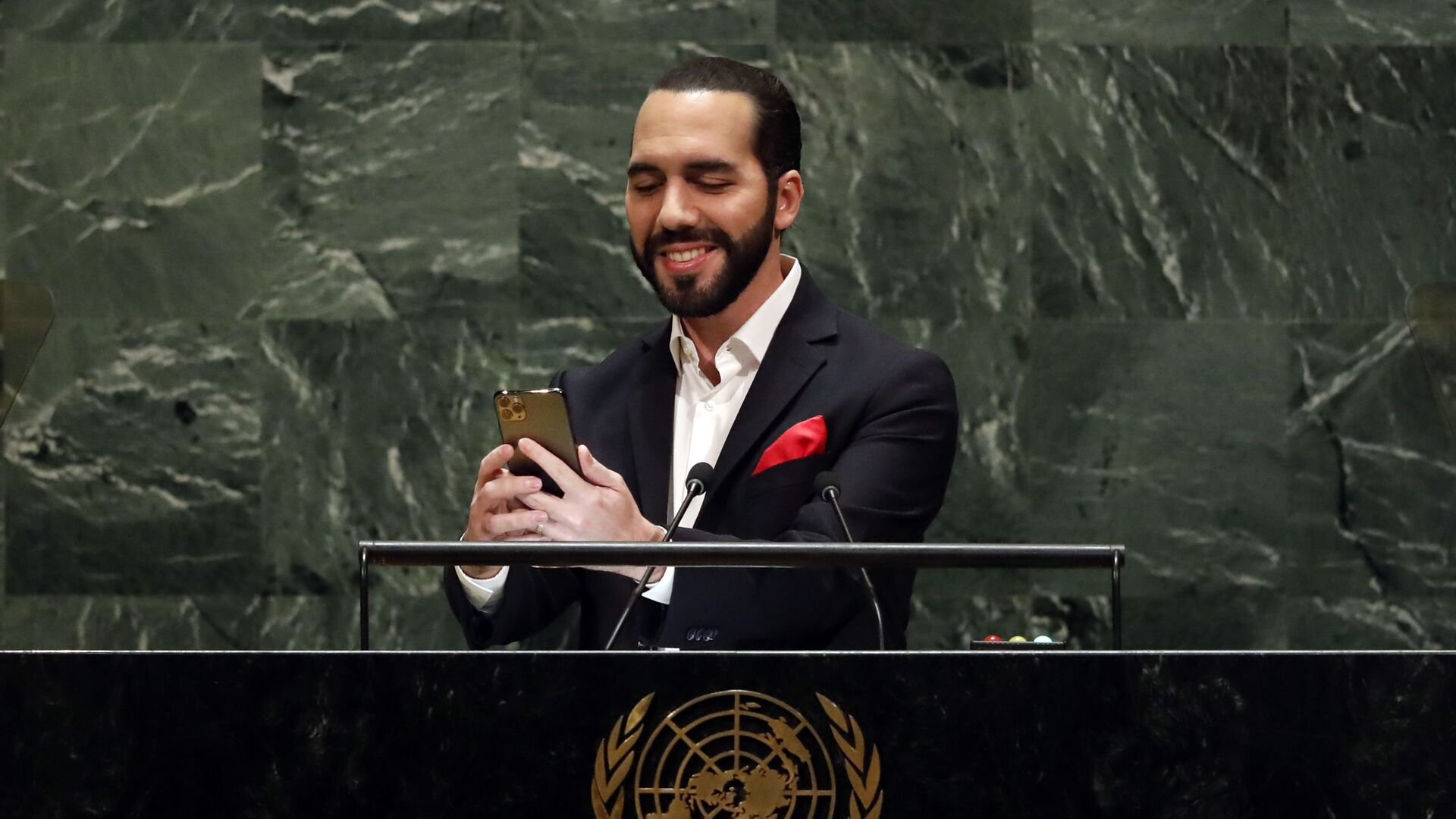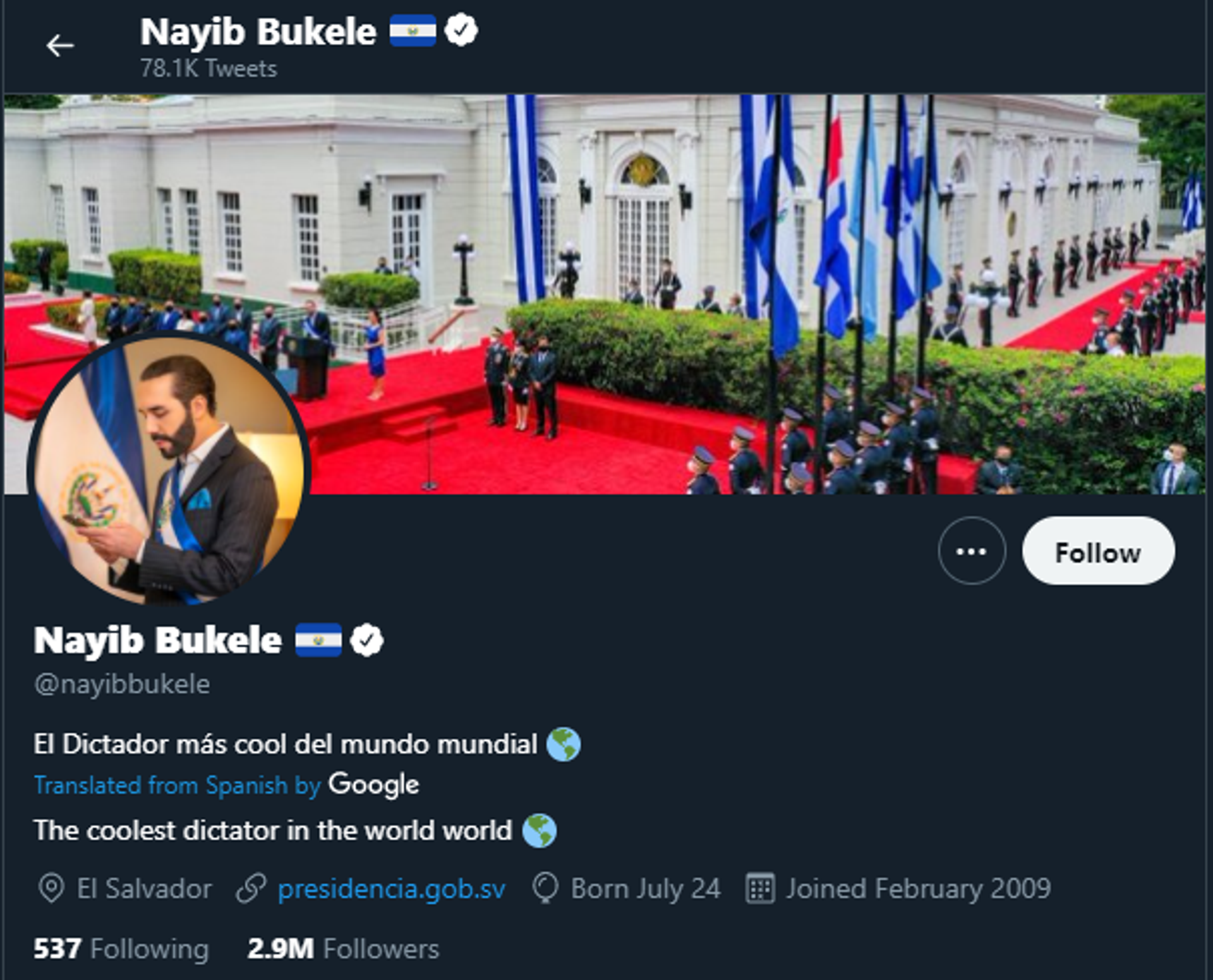‘World’s Coolest Dictator’: El Salvador’s Bukele Changes Branding on Twitter Amid Protests
22:02 GMT 22.09.2021 (Updated: 13:03 GMT 14.04.2023)

© Richard Drew
Subscribe
El Salvador’s millennial ruler, President Nayib Bukele, is trying to parry growing criticism of his administration’s authoritarianism with a bit of snark by changing his Twitter bio to the “coolest dictator in the world” after protests rocked the capital earlier this month.
Bukele made the change on Tuesday after thousands demonstrated in the capital of San Salvador over the weekend, apparently deciding his first snarky change - which simply read “dictator” - on Saturday wasn’t the best thing for his image.
The maneuver calls to mind teenage climate activist Greta Thunberg’s response to then-US President Donald Trump speaking dismissively of her in 2019, which prompted her to change her Twitter bio to match Trump’s tweet. However, there is a much darker prognosis for the Central American nation than there was in the autistic Swedish woman’s playfulness.

The Twitter account of Salvadoran President Nayib Bukele, which he changed on September 22, 2021, to read "the coolest dictator in the world."
Protests have rocked the capital for much of September, provoked in part by the country’s haphazard adoption of bitcoin as a legal tender and investment of national funds into the cryptocurrency, as well as recent moves by Bukele to consolidate power. Demonstrators last week carried signs that read “we were defrauded by Bitcoin” and “no to dictatorship,” the latter of which likely provoked his Twitter bio.
Bukele’s rise to power in the 2019 elections came after a prolonged obstruction campaign by opposition parties to the rule of the Farabundo Marti National Liberation Front (FMLN), a left-wing party that Bukele was once a member of before leaving and basing his presidential campaign on criticizing his former party’s failure to accomplish its policy goals.
Since taking office, Bukele, 40, has overseen a right-wing shift supported by the United States that has included diverting funding for health care toward expanding the police force instead, and has used the COVID-19 pandemic to vastly increase his power and that of the police.
La actividad en el centro histórico de San Salvador transcurre sin sobresaltos mientras un cajero Chivo es consumido por el fuego tras las manifestaciones contra la bitcoinización de El Salvador. Video LPG/Michael Huezo. pic.twitter.com/fMPdWt7MNk
— La Prensa Gráfica (@prensagrafica) September 15, 2021
After his New Ideas party won a supermajority in March elections, Bukele carried out what the Washington Post called a “self-coup,” comparing his sacking of all top judicial officials and their replacement with party loyalists to a near-identical move by Peruvian dictator Alberto Fujumori in 1992, which heralded a new period of authoritarian rule and state terror.
His latest move came late last month after he announced on Twitter it was time to “purge the judicial branch and remove the corrupt,” eliminating one-third of the country's judges and squeezing a ruling from the Constitutional Chamber that would allow him to seek another five years in office.
The US embassy in San Salvador criticized the move on Sunday, saying in a statement that the new justices “undermined democratic processes or institutions by approving a controversial interpretation of the Constitution authorizing re-election of the President despite an express prohibition in the Constitution forbidding consecutive terms of the Presidency.”
Ironically, Bukele has tried to cast the US response as a form of foreign meddling, telling the Associated Press it was “pure politics and the lowest form of interventionism,” and had “nothing to do with corruption.”
“We are not [in] anyone’s backyard,” Bukele tweeted on Monday. “Have a little bit of dignity.”
Veo que hay algunas personas a las que les molesto este tuit.
— Nayib Bukele 🇸🇻 (@nayibbukele) September 21, 2021
Sumamente extraño. ¿O sea que sí debemos ser el “patio trasero” de alguien?
Tengan un poquito de dignidad. Un poquito, no más.
Se siente bien tenerla. https://t.co/DHKPjoaIf1
The quote originally comes from slain Grenadian revolutionary leader Maurice Bishop, who was killed in a power struggle provoked by US intelligence immediately prior to the 1983 invasion of Grenada. Then-US President Ronald Reagan claimed Grenada was seeking an alliance with socialist Cuba and the USSR, and that a new airport under construction was intended to become a Cuban military base.
“No country has the right to tell us what to do or how to run our country or who to be friendly with. We certainly would not attempt to tell any other country what to do,” Bishop said in 1979, a month after the New Joint Endeavor for Welfare, Education, and Liberation (New JEWEL) movement came to power in the former British plantation colony. “We are not in anybody's backyard, and we are definitely not for sale.”
